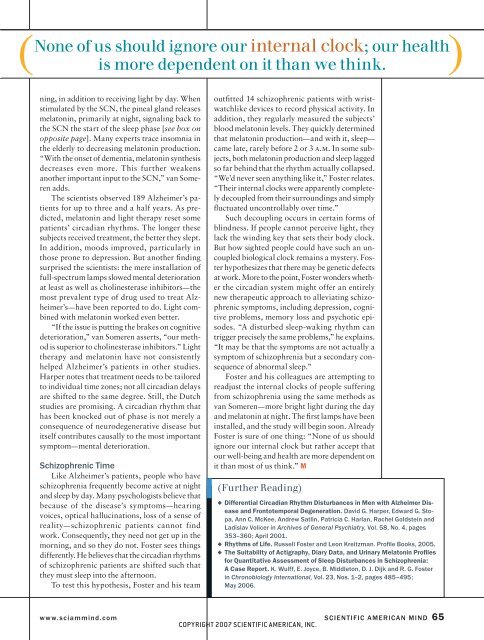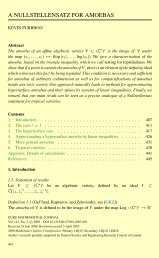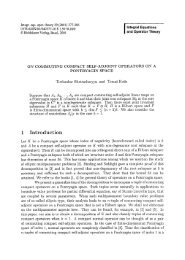Scientific American Mind-June/July 2007
Scientific American Mind-June/July 2007
Scientific American Mind-June/July 2007
You also want an ePaper? Increase the reach of your titles
YUMPU automatically turns print PDFs into web optimized ePapers that Google loves.
( None of us should ignore our internal clock; our health )<br />
is more dependent on it than we think.<br />
ning, in addition to receiving light by day. When<br />
stimulated by the SCN, the pineal gland releases<br />
melatonin, primarily at night, signaling back to<br />
the SCN the start of the sleep phase [see box on<br />
opposite page]. Many experts trace insomnia in<br />
the elderly to decreasing melatonin production.<br />
“With the onset of dementia, melatonin synthesis<br />
decreases even more. This further weakens<br />
another important input to the SCN,” van Someren<br />
adds.<br />
The scientists observed 189 Alzheimer’s patients<br />
for up to three and a half years. As predicted,<br />
melatonin and light therapy reset some<br />
patients’ circadian rhythms. The longer these<br />
subjects received treatment, the better they slept.<br />
In addition, moods improved, particularly in<br />
those prone to depression. But another fi nding<br />
surprised the scientists: the mere installation of<br />
full-spectrum lamps slowed mental deterioration<br />
at least as well as cholinesterase inhibitors—the<br />
most prevalent type of drug used to treat Alzheimer’s—have<br />
been reported to do. Light combined<br />
with melatonin worked even better.<br />
“If the issue is putting the brakes on cognitive<br />
deterioration,” van Someren asserts, “our method<br />
is superior to cholinesterase inhibitors.” Light<br />
therapy and melatonin have not consistently<br />
helped Alzheimer’s patients in other studies.<br />
Harper notes that treatment needs to be tailored<br />
to individual time zones; not all circadian delays<br />
are shifted to the same degree. Still, the Dutch<br />
studies are promising. A circadian rhythm that<br />
has been knocked out of phase is not merely a<br />
consequence of neurodegenerative disease but<br />
itself contributes causally to the most important<br />
symptom—mental deterioration.<br />
Schizophrenic Time<br />
Like Alzheimer’s patients, people who have<br />
schizophrenia frequently become active at night<br />
and sleep by day. Many psychologists believe that<br />
because of the disease’s symptoms—hearing<br />
voices, optical hallucinations, loss of a sense of<br />
reality—schizophrenic patients cannot find<br />
work. Consequently, they need not get up in the<br />
morning, and so they do not. Foster sees things<br />
differently. He believes that the circadian rhythms<br />
of schizophrenic patients are shifted such that<br />
they must sleep into the afternoon.<br />
To test this hypothesis, Foster and his team<br />
outfi tted 14 schizophrenic patients with wristwatchlike<br />
devices to record physical activity. In<br />
addition, they regularly measured the subjects’<br />
blood melatonin levels. They quickly determined<br />
that melatonin production—and with it, sleep—<br />
came late, rarely before 2 or 3 a.m. In some subjects,<br />
both melatonin production and sleep lagged<br />
so far behind that the rhythm actually collapsed.<br />
“We’d never seen anything like it,” Foster relates.<br />
“Their internal clocks were apparently completely<br />
decoupled from their surroundings and simply<br />
fl uctuated uncontrollably over time.”<br />
Such decoupling occurs in certain forms of<br />
blindness. If people cannot perceive light, they<br />
lack the winding key that sets their body clock.<br />
But how sighted people could have such an uncoupled<br />
biological clock remains a mystery. Foster<br />
hypothesizes that there may be genetic defects<br />
at work. More to the point, Foster wonders whether<br />
the circadian system might offer an entirely<br />
new therapeutic approach to alleviating schizophrenic<br />
symptoms, including depression, cognitive<br />
problems, memory loss and psychotic episodes.<br />
“A disturbed sleep-waking rhythm can<br />
trigger precisely the same problems,” he explains.<br />
“It may be that the symptoms are not actually a<br />
symptom of schizophrenia but a secondary consequence<br />
of abnormal sleep.”<br />
Foster and his colleagues are attempting to<br />
readjust the internal clocks of people suffering<br />
from schizophrenia using the same methods as<br />
van Someren—more bright light during the day<br />
and melatonin at night. The fi rst lamps have been<br />
installed, and the study will begin soon. Already<br />
Foster is sure of one thing: “None of us should<br />
ignore our internal clock but rather accept that<br />
our well-being and health are more dependent on<br />
it than most of us think.” M<br />
(Further Reading)<br />
◆ Differential Circadian Rhythm Disturbances in Men with Alzheimer Disease<br />
and Frontotemporal Degeneration. David G. Harper, Edward G. Stopa,<br />
Ann C. McKee, Andrew Satlin, Patricia C. Harlan, Rachel Goldstein and<br />
Ladislav Volicer in Archives of General Psychiatry, Vol. 58, No. 4, pages<br />
353–360; April 2001.<br />
◆ Rhythms of Life. Russell Foster and Leon Kreitzman. Profi le Books, 2005.<br />
◆ The Suitability of Actigraphy, Diary Data, and Urinary Melatonin Profi les<br />
for Quantitative Assessment of Sleep Disturbances in Schizophrenia:<br />
A Case Report. K. Wulff, E. Joyce, B. Middleton, D. J. Dijk and R. G. Foster<br />
in Chronobiology International, Vol. 23, Nos. 1–2, pages 485–495;<br />
May 2006.<br />
www.sciammind.com SCIENTIFIC AMERICAN MIND 65<br />
COPYRIGHT <strong>2007</strong> SCIENTIFIC AMERICAN, INC.

















